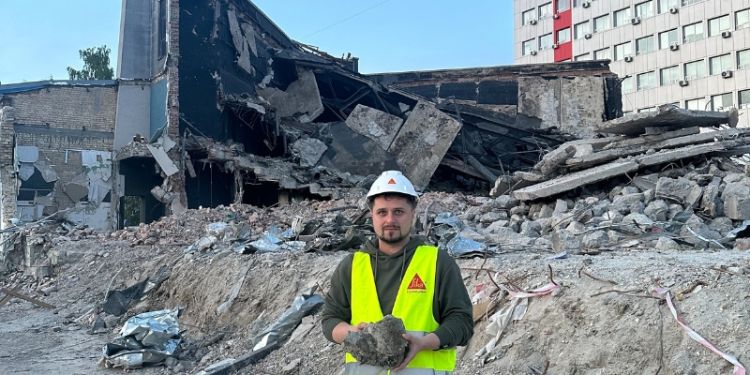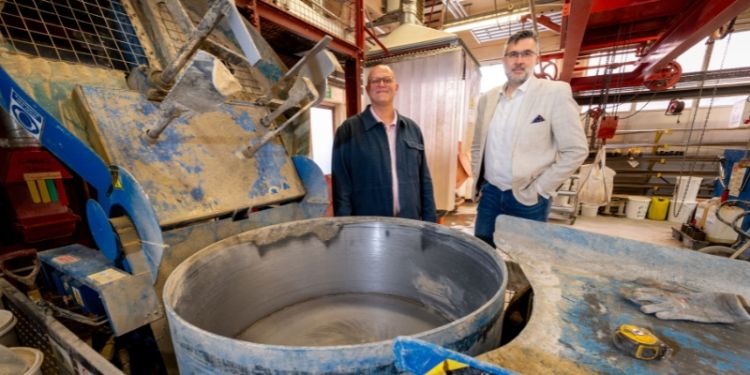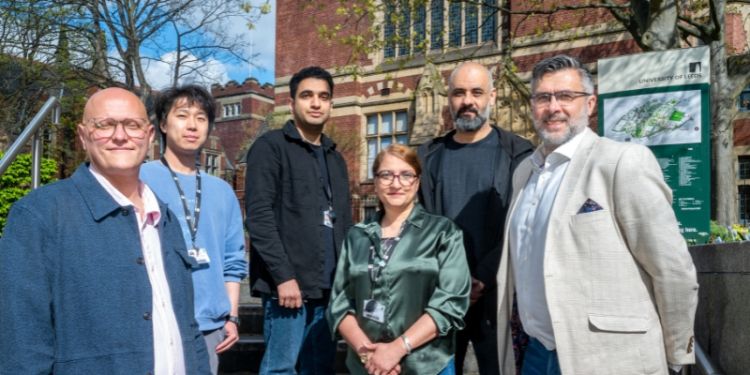Rubble recycling could be key to rebuilding Ukraine

An engineer from Ukraine will travel to the University of Leeds for expert training on using pioneering rubble recycling technology to help rebuild his war-torn country.
Associate Professor Oleksii Hunyak is working with university researchers to reconstruct the 150,000 buildings and structures destroyed by Russian forces in an eco-friendly manner.
The Leeds-led two-year project has received UK Government funding under the first round of InnovateUkraine, a £16 million clean energy competition run by the Foreign, Commonwealth and Development Office (FCDO).
The project supports Ukraine while generating growth and jobs in line with the Government’s Plan for Change.
The University is collaborating with a consortium of British, Ukrainian, and Dutch organisations to deliver the Safe, Sustainable, and Swift Reconstruction of Ukraine (S3RoU) project, which will start recycling some of the estimated 1.4 billion tonnes of concrete debris from bombed buildings.
Rebuilding from the rubble
Professor Hunyak, based at the Lviv Polytechnic National University, is excited about the challenge of using a greener approach to helping his homeland recover from the conflict.
He said: “We are grateful to be working with the University of Leeds to safely recycle rubble from destroyed buildings into new concrete so we can rebuild my country in a faster, cheaper and greener way.
“In Ukraine, we have no experience of recycling concrete – but sadly, we have no shortage of rubble to recycle.
If Ukraine reconstruction is carried out in the traditional way, the consequences for the environment will be hugely significant. Recycling rubble will help people rebuild buildings and their lives in a much more sustainable manner.
“Russia’s illegal war has had such a devastating impact on Ukraine. Inside the university where I work, there is a commemorative collage dedicated to former students who have become fallen soldiers because of the conflict, which serves as a tragic reminder of the terrible price we have to pay for our independence.
“Travelling around Ukraine, I have seen firsthand the damage inflicted upon us by Russian bombing. The most evidence I’ve seen of the fighting is in Bucha and Borodyanka near Kyiv where residential buildings have been turned to rubble and there’s a lot of destroyed bridges. The situation is even worse on the front lines in the east and south of our country.
“My own home in Lviv narrowly escaped being reduced to rubble. A rocket shell exploded about 100 metres from my house a year ago. All the windows shook, and it was really scary.
“Working to rebuild my country from the rubble is something which absolutely drives me. It is important we do this in a sustainable way because we want to play our part as a modern European country in tackling the challenges of climate change that affect the whole world.”

S3RoU project lead Professor Theodore Hanein (left) and Professor Leon Black. Credit: Mark Bickerdike Photography
Eco-friendly process
Leeds is pioneering new technology to safely recycle rubble from destroyed buildings into new concrete, which is as strong and safe as conventional concrete.
The process involves crushing the rubble, stripping out any steel, textiles, or hazardous materials, such as asbestos, and reverse processing it to produce the aggregate materials used to create fresh concrete.
The global construction industry faces challenges in minimising its environmental footprint from cement production and managing demolition waste.
Traditional practices often lead to low-grade reuse of rubble, such as backfill or landscaping, which waste valuable resources and compromises environmental benefits.
It is hoped that the University’s rubble recycling technology can eventually be used to support other countries affected by war or natural disasters, including earthquakes.
Beyond emergencies, cement is estimated to contribute to between 4% and 8% of global CO2 emissions, so adopting this technology could help countries like the UK reach their own Net Zero targets.
Sustainable approach
S3RoU’s project lead, Professor Theodore Hanein, Chair of Construction Materials Science in the School of Civil Engineering at Leeds, said: “We have all seen the harrowing scenes of carnage in Ukraine on our television screens.
“We want to help its people rebuild their country in a way that causes less damage to our planet overall.
“If Ukraine reconstruction is carried out in the traditional way, the consequences for the environment will be hugely significant.
“Recycling rubble will help people rebuild buildings and their lives in a much more sustainable manner.
“By recycling rubble into low-energy and low-carbon construction materials, manufactured in a responsible, resilient, and sustainable manner, we will create a circular economy.
“We will develop technologies that can be used globally in post-conflict and end-of-life infrastructure reconstruction, as well as to help all parts of the world affected by disasters such as earthquakes and floods.”
Four Ukrainian organisations are partners on the project: Lviv Polytechnic National University; the National University of Water and Environmental Engineering in Rivne, western Ukraine; Eco+Logic, a Kyiv-based waste management company; and ReThink, a Ukrainian NGO. Other collaborators include the University of Sheffield, the University of Oxford, Imperial College London, and the Dutch firm C2CA.
The first reconstruction work using recycled rubble is expected to happen later this year.
Professor Hanein explained: “This is a new technology, so another challenge will be combating the public’s perceptions that recycled rubble might be inferior quality.
“Eventually we want to be helping to rebuild people’s houses so families can move back home but initially the plan is to demonstrate recycled rubble is safe by using it to reconstruct a community building such as a museum or town hall.
“We will show that re-using materials from waste concrete is exactly the same quality as using entirely new concrete, and that your house is not going to collapse or have problems.
“We are proud to be playing our part in helping the Ukrainian people to rebuild their communities as they attempt to restore some normality to their lives.”

The Leeds team behind the S3RoU project. Credit: Mark Bickerdike Photography
Cutting-edge innovations
Leon Black, Professor of Infrastructure Materials in the School of Civil Engineering at Leeds, said: “I’m proud to be a part of this project, not just for its support in reconstructing the devastation inflicted by the invasion of Ukraine, but also in helping to develop and demonstrate technology that can be rolled out globally to reduce the environmental impact of demolition waste.”
The InnovateUkraine funding for the University is part of the UK’s commitment to securing a just and lasting peace for the country against Russian aggression.
Prime Minister Keir Starmer announced the 100-Year Partnership with Ukraine earlier this year, and the UK will spend £4.5 billion this year in military aid to support Ukraine.
In a March speech at the British Chambers of Commerce, the Foreign Secretary laid out a ‘new partnership between government and business’ to drive economic growth in the UK and ensure this Government delivers for the British public.
Foreign Secretary David Lammy said: “This government is proud to be harnessing cutting-edge innovations from businesses and universities right across the UK to help Ukraine rebuild from Russia’s illegal invasion greener and more resilient than ever before.
“The InnovateUkraine challenge fund is a powerful demonstration of the UK’s unbreakable support for Ukraine as we work towards securing a just and lasting peace for the country against Russian aggression.
“The 100 Year Partnership with Ukraine is a vital part of the UK Government’s Plan for Change – helping boost security and growth in a sustainable way for both countries for generations to come.”
Further Information
- Main image: Professor Oleksii Hunyak, from Lviv Polytechnic National University
- For media inquiries or interview requests, please email press officer Deb Newman via d.newman@leeds.ac.uk.




